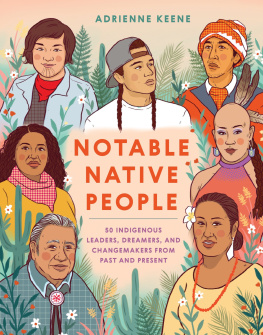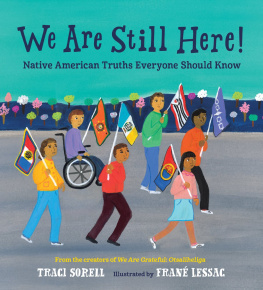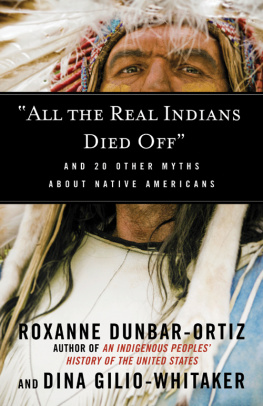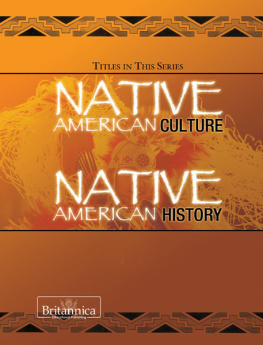This book was published in association with the William P. Clements Center for Southwest Studies at Southern Methodist University by the University of North Carolina Press.
2019 The University of North Carolina Press
All rights reserved
Set in Charis by Westchester Publishing Services
Manufactured in the United States of America
The University of North Carolina Press has been a member of the Green Press Initiative since 2003.
Library of Congress Cataloging-in-Publication Data
Names: Miller, Douglas K., 1976 author.
Title: Indians on the move : Native American mobility and urbanization in the twentieth century / Douglas K. Miller.
Other titles: Critical indigeneities.
Description: Chapel Hill : University of North Carolina Press, [2019] | Series: Critical indigeneities | Includes bibliographical references and index.
Identifiers: LCCN 2018036571 | ISBN 9781469651378 (cloth : alk. paper) | ISBN 9781469651385 (pbk : alk. paper) | ISBN 9781469651392 (ebook)
Subjects: LCSH : Indians of North AmericaUnited StatesSocial conditions. | Indians of North AmericaGovernment relationsHistory. | Indians of North AmericaUrban residence. | Migration, InternalUnited States.
Classification: LCC E 98. S 67 M 55 2019 | DDC 970.004/97dc23 LC record available at https://lccn.loc.gov/2018036571
Cover illustrations: Photographs from BIA Relocation Records, Edward E. Ayer Manuscript Collection, Newberry Library, Chicago.
Acknowledgments
Where to begin. So many remarkable people have provided me so much support, guidance, perspective, trust, and encouragement. Its an honor to acknowledge them here.
The late Erskine Carter, my English literature professor, was my first great academic influence, as well as an early film, literature, and Dylanology guru. He taught me that its important to spend some time with it. I didnt get a chance to express my adoration and appreciation prior to his passing. Before I ever would have guessed that I would end up in this profession, he showed me that its okay to be unconventional (myself).
At the University of Minnesota, Jeani OBriens class changed my life course. You should go to graduate school, Doug, she said one afternoon in her office, where I used to linger with so many questions. Whats graduate school? I replied, quite seriously. She saw something in me that I could not see. On her advice, I broke up my band and moved to Chicago. And she was right. Here I am today. Unbelievable.
At the University of Illinois at Chicago, my thesis adviser, Brian Hosmer, coached me up from a musician posing as a history student to a history student posing as a musician. He created so many opportunities for me over the years, and he remains a loyal advocate and caring mentor to this day.
At the University of Oklahoma, my doctoral adviser, Warren Metcalf, provided outstanding guidance, perspective, and support. He was the calm but confident mentor I needed for such an ambitious research project at a challenging time in my life. Also at OU, I appreciated generous support and advice from David Wrobel, Josh Piker, Robert Griswold, Bob Rundstrom, Terry Rugeley, Steve Gillon, and Sterling Evans.
I remain so fond of my time at Southern Methodist Universitys Clements Center for Southwest Studies, where I joined a new family. Sherry Smith believed and invested in my project, my future, and me. She listened carefully and kept the faith. Andy Graybill became and remains a great friend, professional adviser, and champion of my work. Ruth Ann Elmore was the first person I met upon arriving in Dallas. What a great ambassador! More than that, she became my dear friend. My fellow fellowsRachel St. John, Andrew Offenberger, and Gavin Benkemade my fellowship year an especially enjoyable experience. At my Clements Center manuscript workshop, I received unparalleled and truly inspiring instruction on the crafts of writing, conceptualization, and analysis from my workshop invitees Phil Deloria and Robert Self. As well, I benefited from thoughtful critiques and encouragement from fellow workshop participants Ed Countryman, Louis Warren, Neil Foley, Todd Kerstetter, Max Krochmal, Margaret Neubauer, Steve Denson, Sami Lakomki, and Lisa Barnett. Such a fine group of scholars; I truly miss the Clements Center.
I am so grateful for Oklahoma State University providing me the opportunity to harness all of this support, inspiration, and mentorship in service of my own career, colleagues, and students. From this side of the profession, I now try to pay things back and forward. But then Im just accumulating more debt here. I sincerely appreciate my wonderful students and faculty colleagues here in Stillwater. In her capacity as history department head, Laura Belmonte offered reliable and extensive support for my book project, my teaching, and my general role within the department. I am indebted to my faculty writing group colleaguesJim Huston, Rick Rohrs, Laura Belmonte, John Kinder, Yongtao Du, Holly Karibo, Thomas Carlson, Emily Graham, Anna Zeide, Matt Schauer, Richard Boles, Louise Siddons, and Laura Aratafor providing critical feedback on my work. I thank my entire department for the friendship, generosity, enthusiasm, and support they have demonstrated since my arrival.
At UNC Press, I am especially grateful for my editor Mark Simpson-Voss strong support for my project. Mark did an outstanding job shepherding this book through publication. He listens patiently and carefully, and takes my ideas and concerns seriously. He has been the nurturing presence I needed. At UNC Press, I also thank Jessica Newman and Cate Hodorowicz for their hard work bringing this book to fruition. As well, I sincerely thank my two anonymous manuscript reviewers for providing careful and encouraging feedback that made this a much better book. Finally, I thank J. Kehaulani Kauanui and Jeani OBrien for inviting my book into their series.







